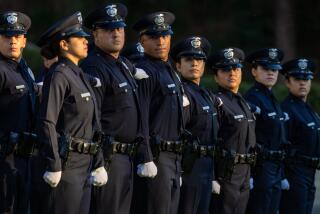Brazil’s Toughest Cops Get Touchy-Feely
- Share via
SAO PAULO, Brazil — Learning ikebana, the art of Japanese flower arranging, wasn’t exactly what Alexandre Zakir had in mind when he decided to become a cop.
Nor did his colleague, Alfredo Scaff, imagine that law enforcement would have him practicing the slow, graceful movements of tai chi chuan, the ancient Chinese meditative discipline.
But both say the unorthodox training has made them better police officers.
“At first, I doubted that arranging flowers could help me learn how to deal with criminals,” Zakir said. “But ikebana helped me become aware of the importance of seeking a point of equilibrium between police work and my condition as a human being.”
If that sounds strange coming from a cop, it’s even stranger in Sao Paulo, where police have a reputation as notoriously violent, hard-nosed tough guys.
And that’s just why the Sao Paulo Police Academy began the six-month courses for district police chiefs. The goal is to create a “humane police force.”
“In the past, the academy trained killers,” academy director Tabajara Novazzi Pinto said in an interview. “Now we are slowly but surely reeducating our police to serve the community instead of repressing it.”
Pinto said police brutality is a legacy of the military dictatorship that ruled Brazil from 1964 to 1985. Police helped to hunt suspected subversives and were answerable only to the military.
“We can no longer tolerate a police force made up primarily of gorillas, trained to view society as the enemy that has to be subdued and, if necessary, wiped out,” Pinto said.
The academy’s new curriculum, which includes human rights and nonlethal shooting techniques, “helps us eliminate the authoritarian tendencies that many future policemen have even before they are admitted to the academy,” Pinto said.
When Pinto learned that the samurai warriors of ancient Japan practiced ikebana before and after a stressful day on the battlefield, he decided to try it on his troops.
Abuse of power “is the result of a lack of inner harmony and self-awareness, which ikebana and tai chi chuan provide,” he said.
Those two courses are not mandatory, and many students at first balked at signing up.
“They felt their masculinity was at stake,” Pinto said. “But curiosity got the better of them.”
Students are required to take courses on human rights and good manners “to have a better idea of how to treat people,” he said. They also must learn how to shoot without killing.
“Until recently, target-practice priorities were the head and the thorax,” Pinto said. “Now, they are the legs and arms.”
Zakir and Scaff are two of 81 new district police chiefs who took the full course and hope to influence veteran officers trained in the brutal methods of the past.
“It won’t be easy,” Pinto said. “There are more than 2,000 veterans. Many of them are firm believers in the old school of repression and scoff at our efforts, asking questions like, ‘What are you going to teach next--belly dancing?’ ”
And relaxation training won’t reach all police officers.
The academy trains only members of the civil police force, whose 35,000 officers serve as plainclothes detectives, crime-scene specialists, coroners, prison guards and other non-patrol roles.
The 20,000 uniformed members of the state police force who patrol the streets have their own violence-curbing program, which includes courses on weapons handling, martial arts and human rights. Ikebana and tai chi chuan are not being considered at this point, the State Security Bureau says.
Although Zakir admits he learned a lot from ikebana, he hasn’t pursued it since graduation. These days, he prefers to find his inner balance through swimming and jogging.
Scaff also prefers to work out, but says that “ikebana and tai chi chuan were fundamental in learning how to cope with the daily stress of a police precinct.”
More to Read
Sign up for Essential California
The most important California stories and recommendations in your inbox every morning.
You may occasionally receive promotional content from the Los Angeles Times.













